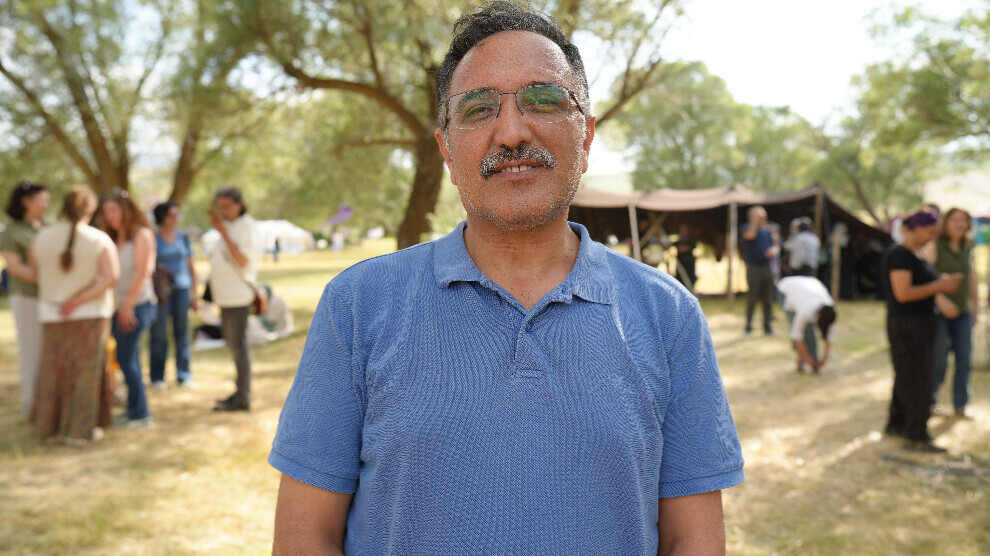Akay: Peace process cannot be reduced to ill prisoners
Soydan Akay stated that the peace process is not tied to prisons or ill prisoners but is a broader process of struggle.
Soydan Akay stated that the peace process is not tied to prisons or ill prisoners but is a broader process of struggle.

There are 1,500 ill prisoners in Turkish prisons, 600 of them in critical condition, according to data from the Human Rights Association (IHD). Along with the call for peace, people expecting concrete steps frequently state that the first step should be the release of ill prisoners.
Soydan Akay, one of the ill prisoners released after 32 years in prison, said that the government aims to overshadow the real agenda by shaping all public discourse around ill prisoners. Akay stated that “the peace process cannot be reduced to prisons,” and emphasized that social dynamics need to carry out effective work on this issue.
Soydan Akay (49) was arrested in Izmir in 1993 on the allegation of being the “Kurdistan Workers’ Party (PKK) Aegean Region Officer.” He was sentenced to life imprisonment by the State Security Court (DGM). Akay was held in prison for 32 years and was transferred between the prisons of Izmir, Aydın, Nazilli, Kırıklar, Siirt (Sêrt), Diyarbakır (Amed), Maltepe, and Silivri.
After the coup attempt on 15 July 2016, Soydan Akay was transferred from Silivri Prison to Maltepe Prison, where he was placed in the ward of judicial detainees. He was attacked shortly thereafter. He was then transferred back to Silivri Prison, where, despite not having an aggravated life sentence, he was placed in a solitary cell.
In 2018, Akay was diagnosed with prostate cancer. He also suffers from rheumatism, hepatitis B, and heart spasms. For these reasons, he was included in the IHD’s list of ill prisoners. Nevertheless, despite not having an aggravated life sentence, he was held in a single cell for seven years.
Although the conditions for conditional release were met in 2023, Soydan Akay’s release was postponed four times by the Execution and Observation Board (IGK). He was released from Silivri Prison on Monday, 12 May.
Akay spoke to ANF, evaluating the situation of ill prisoners in prisons and the ongoing process following the call for peace.
The government is deliberately keeping it in limbo
Soydan Akay stated that the issue of ill prisoners is a humanitarian and moral matter and added that no new legal regulation is needed to resolve it. He said: “There is no need for any law. This is entirely a matter of implementation. If the government wants to, it can resolve it in two days. The current administration is consciously keeping this issue in limbo.”
The peace process is not a matter tied to prisons
Akay said the government wants to constantly turn the issue of ill prisoners into a bargaining chip.
Akay said: “They are making political calculations. By dragging it out, they want to turn this issue into a bargaining tool with the Kurds and democratic forces during election periods.” He stressed that the release of ill prisoners is essential, but the peace process cannot be reduced to this issue alone.
Akay added: “They want to use it for election bargaining with the Kurds and democratic forces as much as possible. That is the main point. Secondly, this process is truly a process of struggle. The peace process is not something where all negotiations have been made, all preparations completed, and everything resolved directly. It is a process of struggle. The government is also holding onto this issue on a psychological level, trying to draw all attention to the prisons.” He said the government is using the matter as a psychological tool to distract society.
The resisting spirit of the prisons must be made visible
Soydan Akay said the conditions in prisons are extremely poor, which is why illnesses have come to the forefront. He emphasized that what truly needs to be brought into view is the spirit of resistance inside. He described the atmosphere inside the prison and said: “What should be highlighted about our comrades is their fighting spirit. They are hopeful, cheerful, and smiling people. That’s how we are even within four walls. Everyone inside, despite their illnesses, maintains a strong and dignified stance. It is a space of resistance. Whether ill or not, everyone inside wants to live with dignity, to research, to think, and to show a sensitive attitude toward society and politics. Those who are released come out with high morale. They never bow down in any way.”
Social forces must take responsibility
Akay said the peace process should be approached from a broad democratization perspective and criticized the government for trying to obscure the real issues by directing all attention toward ill prisoners.
Akay said: “All attention has been drawn to ill prisoners. Among the people, a perception is being created: ‘If ill prisoners are released, the problem will be solved, peace will come.’ But this is part of a much larger struggle. Instead of waiting for the government to take action, social forces need to develop more sensitive and concrete projects in this area. Otherwise, this problem will remain on the agenda continuously in the future.
The real aim is to obscure the field of democratization. The peace process is not something entirely tied to prisons. Nor can it be reduced to ill prisoners. This is a process of struggle.”
In his final remarks, Akay said that the problems experienced both inside and outside are part of the same whole. He renewed his call and said, “Those who are imprisoned are an expression of our social reality. They are also a truth of the struggle. This issue must be approached not only emotionally, but also from a political and social perspective.”